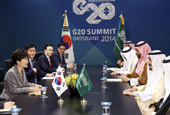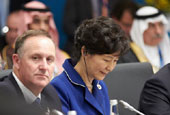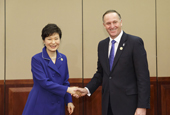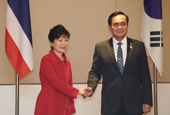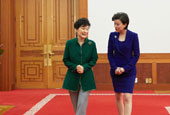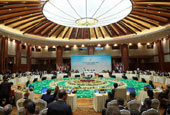President Park Geun-hye attended the two-day G20 summit in Brisbane, Australia, on November 15 and 16. While there, she emphasized regulatory reform in her speech on November 15, part of her administration's strategic efforts to create more jobs. During the Retreat Session, her first official scheduled event in Australia, she shared the nation's experiences and spoke about the efforts which the Korean government has put forth regarding regulatory reform. Regulatory reform is one of the key projects of her administration's economic three-year plan.
President Park first introduced three steps needed to achieve reform. She said that any new plan should win the favor of the people and be carried out with continuous communication with them before it is settled on and, finally, realized.
She said that Korea plans to reduce 10 percent of its existing regulations that are not directly related to the lives and safety of the people, and then a further 20 percent by 2017. She also explained that Korea has adopted a so-called "guillotine system" which can deal with core and critical regulations in a top-down manner en bloc, as otherwise it would require too much time and too many steps.
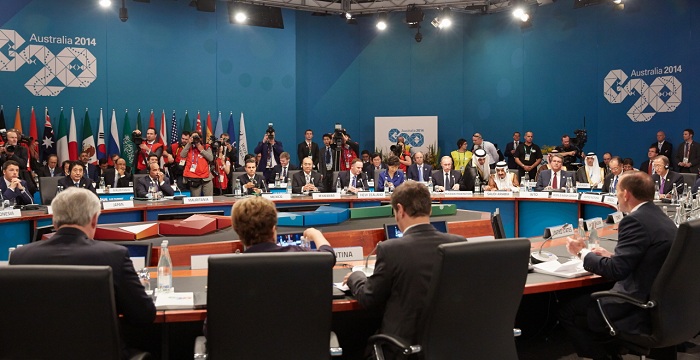
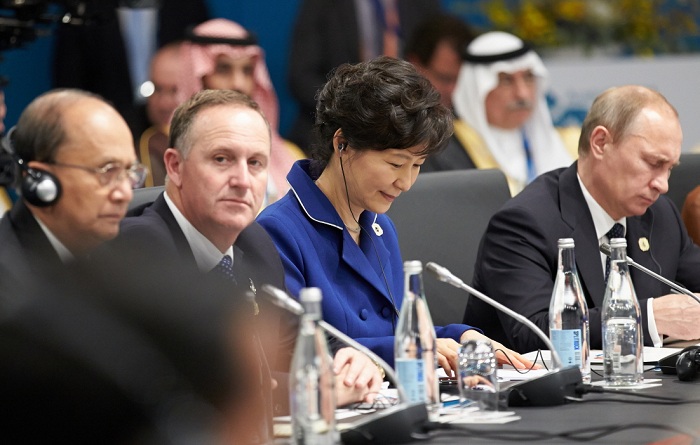
She also introduced a "cost in, cost out" system that has been established to manage new regulations and to protect regulations from being revived again and again. The president pointed out that there are many countries vulnerable to regulatory reforms, especially in their service industries, and suggested that relevant joint studies be carried out at international organizations such as the OECD.
Proposal for developing the creative industries, a new growth engine of the economy
On the same day, Park raised awareness of the importance of economic development through global trade during the official banquet. She suggested the adoption of a "creative industry" for the global economy in need of new growth engines. She also emphasized the need for a discussion about such an agenda for developing nations.
President Park mentioned that Korea's smartphones are products, "made in the world," not only, "made in Korea." She explained that many nations are involved in the global value chain (GVC) and in the creation of added value.
She also emphasized the role that could be played by G20 nations in encouraging developing nations to participate in the GVC. She emphasized that it would not only bring development to those economies but it might grow into a breakthrough for the global economy due to new sources of demand. Along with this, she emphasized the importance of the balanced prosperity of developed and developing nations through an expansion of global trade.
The president introduced the concept of an "innovative economy" that can be achieved when the creative industries become a new engine powering the economy, overcoming low growth rates. She stressed that creative ideas can create new markets and jobs, and that science, technology, information and communications technologies and industry can all be incorporated together to create new value. Also, she mentioned that Korea is working on building a "creative economy belt" to boost cooperation between large and medium corporations, start-up ventures and universities, developing the merits of each organization. As an example, she explained the relationship between the city of Daegu and the Samsung conglomerate and between the cities of Daejeon and Sejong City and the SK conglomerate as well as Creative Economy Innovation Centers throughout major cities.
The president continued to emphasize the importance of peer-learning between member countries when it comes to the creative industries. She said that sharing each other's experiences and learning lessons from each other would contribute to the revival of the global economy.
She also noted that Korea used to be a very poor nation about 50 years ago, but that it has achieved quick development through the Saemaul Undong project, a series of agricultural development policies in the 1970s and 1980s. Park suggested that next year other heads of state deal with agendas related to development for the balanced development of both G20 and developing nations.
Discussion on the resilience of the global economy
During Session Two of the G20 Summit on November 16, President Park discussed with other heads of state ways to increase the resilience of the global economy. She pointed out that a number of developed economies recently came up with quite different fiscal policies, which led to increased variability in the international money market. She emphasized that such unbalanced currency exchange rates with the major currencies can be a big burden on some emerging nations.
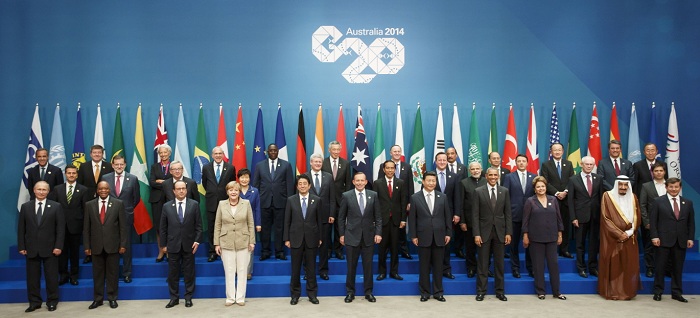
She said that economic policies established for the benefit of certain countries can have a negative spillover effect, prompting backlashes and giving a negative impression back in the developed economies.
In that sense, Park emphasized that the fiscal policy of each nation should be carefully explained and adjusted as agreed upon at last year's summit, and that the G20 should play a critical role in such policy coordination.
In addition, President Park stressed the need for financial safety nets in case of any possible financial instability. As part of these efforts, she first urged for the prompt implementation of the IMF Quota and Governance Reform program agreed upon at the Seoul G20 Summit in 2010. Second, she stressed the need to strengthen the role of the Regional Financial Arrangement (RFA), as well as close cooperation between the IMF and the RFA.
Discussions on effective measures on climate change
During Session Three, President Park stressed the importance of funding the Green Climate Fund (GCF) and Korea's efforts in the revival of new industrial energies, urging for the participation of other G20 groups.
Park emphasized that climate change is a critical issue that can be a threat to the survival and safety of people everywhere, and that it requires cooperation and action of the international community for there to be any effective countermeasures.
She also explained that by 2020 Korea has pledged to reduce its emissions of greenhouse gases by 30 percent, compared to Business-As-Usual (BAU), and that it will implement an Emissions Trading Scheme by 2015.
Moreover, President Park stressed that the participation of developing nations is essential for the effective reduction of greenhouse gas emissions, and that for that to happen, the role of the GCF and its financing is an important issue.
She emphasized that Korea has vowed to support the GCF, planning to give USD 100 million at most, as agreed at the U.N. Climate Summit held last September. She urged all G20 countries to participate in the GCF financing summit that is scheduled to take place on November 19 and 20 in Berlin.
By Wi Tack-whan, Lee Seung-ah
Korea.net Staff Writers
whan23@korea.kr
President Park first introduced three steps needed to achieve reform. She said that any new plan should win the favor of the people and be carried out with continuous communication with them before it is settled on and, finally, realized.
She said that Korea plans to reduce 10 percent of its existing regulations that are not directly related to the lives and safety of the people, and then a further 20 percent by 2017. She also explained that Korea has adopted a so-called "guillotine system" which can deal with core and critical regulations in a top-down manner en bloc, as otherwise it would require too much time and too many steps.


President Park Geun-hye (third from left) and other heads of state take part in Session One of the G20 Summit held at the Brisbane Convention & Exhibition Centre (BCEC) in Australia on November 15. (photos: Cheong Wa Dae)
She also introduced a "cost in, cost out" system that has been established to manage new regulations and to protect regulations from being revived again and again. The president pointed out that there are many countries vulnerable to regulatory reforms, especially in their service industries, and suggested that relevant joint studies be carried out at international organizations such as the OECD.
Proposal for developing the creative industries, a new growth engine of the economy
On the same day, Park raised awareness of the importance of economic development through global trade during the official banquet. She suggested the adoption of a "creative industry" for the global economy in need of new growth engines. She also emphasized the need for a discussion about such an agenda for developing nations.
President Park mentioned that Korea's smartphones are products, "made in the world," not only, "made in Korea." She explained that many nations are involved in the global value chain (GVC) and in the creation of added value.
She also emphasized the role that could be played by G20 nations in encouraging developing nations to participate in the GVC. She emphasized that it would not only bring development to those economies but it might grow into a breakthrough for the global economy due to new sources of demand. Along with this, she emphasized the importance of the balanced prosperity of developed and developing nations through an expansion of global trade.
The president introduced the concept of an "innovative economy" that can be achieved when the creative industries become a new engine powering the economy, overcoming low growth rates. She stressed that creative ideas can create new markets and jobs, and that science, technology, information and communications technologies and industry can all be incorporated together to create new value. Also, she mentioned that Korea is working on building a "creative economy belt" to boost cooperation between large and medium corporations, start-up ventures and universities, developing the merits of each organization. As an example, she explained the relationship between the city of Daegu and the Samsung conglomerate and between the cities of Daejeon and Sejong City and the SK conglomerate as well as Creative Economy Innovation Centers throughout major cities.
The president continued to emphasize the importance of peer-learning between member countries when it comes to the creative industries. She said that sharing each other's experiences and learning lessons from each other would contribute to the revival of the global economy.
She also noted that Korea used to be a very poor nation about 50 years ago, but that it has achieved quick development through the Saemaul Undong project, a series of agricultural development policies in the 1970s and 1980s. Park suggested that next year other heads of state deal with agendas related to development for the balanced development of both G20 and developing nations.
Discussion on the resilience of the global economy
During Session Two of the G20 Summit on November 16, President Park discussed with other heads of state ways to increase the resilience of the global economy. She pointed out that a number of developed economies recently came up with quite different fiscal policies, which led to increased variability in the international money market. She emphasized that such unbalanced currency exchange rates with the major currencies can be a big burden on some emerging nations.

President Park Geun-hye (fourth from left, second raw) along with other heads of state pose for a group photo after Session One of G20 Summit, held at the BCEC on November 15. (photo: Cheong Wa Dae)
She said that economic policies established for the benefit of certain countries can have a negative spillover effect, prompting backlashes and giving a negative impression back in the developed economies.
In that sense, Park emphasized that the fiscal policy of each nation should be carefully explained and adjusted as agreed upon at last year's summit, and that the G20 should play a critical role in such policy coordination.
In addition, President Park stressed the need for financial safety nets in case of any possible financial instability. As part of these efforts, she first urged for the prompt implementation of the IMF Quota and Governance Reform program agreed upon at the Seoul G20 Summit in 2010. Second, she stressed the need to strengthen the role of the Regional Financial Arrangement (RFA), as well as close cooperation between the IMF and the RFA.
Discussions on effective measures on climate change
During Session Three, President Park stressed the importance of funding the Green Climate Fund (GCF) and Korea's efforts in the revival of new industrial energies, urging for the participation of other G20 groups.
Park emphasized that climate change is a critical issue that can be a threat to the survival and safety of people everywhere, and that it requires cooperation and action of the international community for there to be any effective countermeasures.
She also explained that by 2020 Korea has pledged to reduce its emissions of greenhouse gases by 30 percent, compared to Business-As-Usual (BAU), and that it will implement an Emissions Trading Scheme by 2015.
Moreover, President Park stressed that the participation of developing nations is essential for the effective reduction of greenhouse gas emissions, and that for that to happen, the role of the GCF and its financing is an important issue.
She emphasized that Korea has vowed to support the GCF, planning to give USD 100 million at most, as agreed at the U.N. Climate Summit held last September. She urged all G20 countries to participate in the GCF financing summit that is scheduled to take place on November 19 and 20 in Berlin.
By Wi Tack-whan, Lee Seung-ah
Korea.net Staff Writers
whan23@korea.kr
